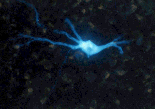| Sponsored by Wake Forest University School of Medicine and National Families in Action | |||
| Glossary - R | |||
| This Glossary comes from False Messengers: How Addictive Drugs Change the Brain by David Friedman, PhD, and Sue Rusche, Harwood Academic Publishers, Amsterdam, The Netherlands, 1999. A
| B | C
| D | E
| F | G
| H | I
|
|
|||
| R Receptor A large molecule that recognizes specific chemicals (normally neurotransmitters, hormones, and similar endogenous substances) and transmits the message carried by the chemical into the cell on which the receptor resides. Rehabilitate Helping a person recover from drug addiction. Rehabilitation teaches the addict new behaviors to live life without drugs. Relapse In general, to fall back to a former condition. Here, resuming the use of a drug one has tried to stop using. Relapse is a common occurrence in many chronic disorders that require behavioral adjustments to treat effectively. Respiratory center A small set of nuclei in the brain stem that regulate the speed and depth of breathing ultimately by controlling the muscles that move our chest and diaphragm. Reuptake The process by which neurotransmitters are removed from the synapse by being "pumped" back into the axon terminals that first released them. Reuptake pump The large molecule that actually transports neurotransmitter molecules back into the axon terminals that released them.
|
|
Reward The process that reinforces behavior. It is mediated at least in part by the release of dopamine into the nucleus accumbens. Human subjects report that reward is associated with feelings of pleasure. Rock A small amount of crack cocaine in a solid form; free-base cocaine in solid form. Route of administration The way a drug is put
into the body. Eating, drinking, inhaling, injecting, snorting, smoking,
and absorbing a drug through mucous membranes a route of administration
used to consume drugs of abuse. Rush Intense feelings of euphoria a drug produces when it is first consumed. Drug users who inject or smoke drugs describe their rush as being sometimes as intense, or even more intense, than sexual orgasm.
|
|
| Home | Journalists | Legislatures | Science Update | Links | Glossary | About |
Last Revision
info@addictionstudies.org

